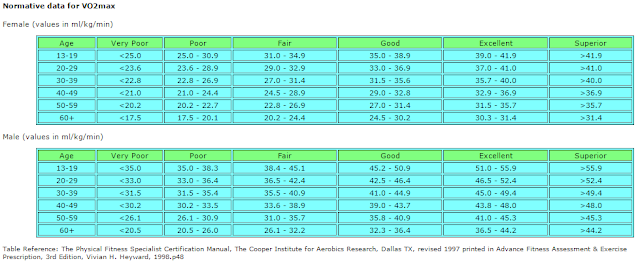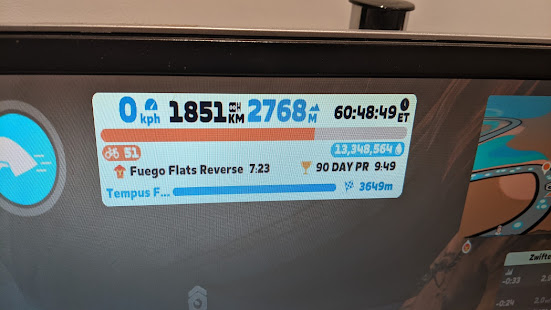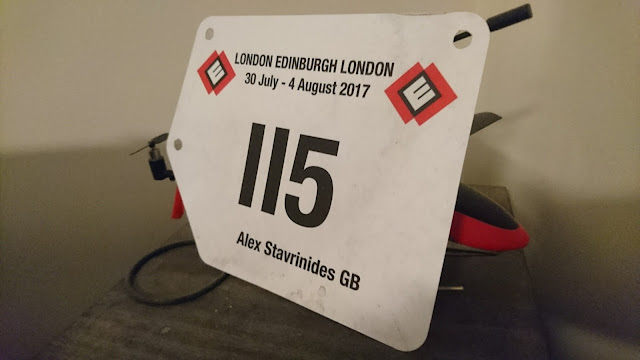VO2max testing and carbohydrate trials.
While I have a few minutes before starting work.....
The VO2max test is simplistic in some sense - work as hard as you, when you can't go any further, see what you oxygen transfer is at this point and here you'll find your VO2max. This is maximum rate of oxygen consumption the body can carry out. For performance and those who wish to go further and faster, the higher the number the better. The test used consisted of a short warm up and then going into stages of increase resistance starting at 95 Watts and increasing by 35 Watts every 3 minutes until the legs say "no more." This is the same method that was used in the lactate test pre-Christmas with Lynsey. The difference this time was that in the last minute, a breathing tube is used and all the expelled breath is collected in a Teglar bag for analysis (volume and composition). This method is different to the breath-by-breath method, although I am informed that this is a better method (don't quote me, this isn't my specialist knowledge field).
"For the feels" I felt better this time then before the similar test pre-Christmas. For the numbers, I still need to look at more detail, but my threshold was higher, my peak power was around 280W and heart rate in the order of 168 bpm.
Abdullah did the analytical steps for the VO2max giving me a value of 52 ml/kg/min. In the grand scheme of things, I'm "fairly" happy with this. I need to find more performance reference tables to understand the figure more, but compared to the general population, I'm in good to very good condition. Compared to my idols, I'm more human. For my ambitions, I have a number that I want to improve.
EDIT: For the famous numbers, a number of people come to comparison. The highest reported VO2max scores are around 97 ml/kg/min, although this goes into the some of the more sinister areas of sports - doping. The verification of certain reported values (in and out of competition, declared clean results that are later revealed as doped etc) make certain claims problematic. As doping with products such as EPO can artificially manipulate the oxygen transport potential, the grey areas in cycling, skiing and athletics puts question marks on certain performances. As a "benchmark," the value given by Greg LeMond of 92.5 ml/kg/min is often used as a clean result. In comparison, Miguel Indurain had a result of 88 ml/kg/min at his peak. The Texan......... I don't even trust his shoe size. For a list of results, here's a link
For normality, the average untrained male of comparable age would have a 35-40 ml/kg/min.
Based on the normative values table, my performance will put me into the "superior" category although the boundary appears to move depending on data source.
From the off, I thought I was doing better than expected. Around 100 kJ my pace slowed and I went through a rough bit - part of it mental as I could see the kJ's going up slower. Once I'd recovered a bit, thought of my foot action and settled again, I got in a rhythm and the last 100 kJ wasn't too bad. I hit 306 kJ, the clock stopped, and I shouldn't know any more until some time in the future. I have some heart rate data from the night which I've filed away and won't look at for a few weeks.
VO2max testing.
On Friday 15th of January, I met Abdullah Alghannam of Loughborough University after work for a test for his current carbohydrate study. As the study is running over the coming weeks, the VO2max testing acts as a baseline for his data looking at my response to carbohydrate and training - my diet in the coming days will be in his hands and I intend on blogging this information as the trial progresses.The VO2max test is simplistic in some sense - work as hard as you, when you can't go any further, see what you oxygen transfer is at this point and here you'll find your VO2max. This is maximum rate of oxygen consumption the body can carry out. For performance and those who wish to go further and faster, the higher the number the better. The test used consisted of a short warm up and then going into stages of increase resistance starting at 95 Watts and increasing by 35 Watts every 3 minutes until the legs say "no more." This is the same method that was used in the lactate test pre-Christmas with Lynsey. The difference this time was that in the last minute, a breathing tube is used and all the expelled breath is collected in a Teglar bag for analysis (volume and composition). This method is different to the breath-by-breath method, although I am informed that this is a better method (don't quote me, this isn't my specialist knowledge field).
"For the feels" I felt better this time then before the similar test pre-Christmas. For the numbers, I still need to look at more detail, but my threshold was higher, my peak power was around 280W and heart rate in the order of 168 bpm.
Abdullah did the analytical steps for the VO2max giving me a value of 52 ml/kg/min. In the grand scheme of things, I'm "fairly" happy with this. I need to find more performance reference tables to understand the figure more, but compared to the general population, I'm in good to very good condition. Compared to my idols, I'm more human. For my ambitions, I have a number that I want to improve.
EDIT: For the famous numbers, a number of people come to comparison. The highest reported VO2max scores are around 97 ml/kg/min, although this goes into the some of the more sinister areas of sports - doping. The verification of certain reported values (in and out of competition, declared clean results that are later revealed as doped etc) make certain claims problematic. As doping with products such as EPO can artificially manipulate the oxygen transport potential, the grey areas in cycling, skiing and athletics puts question marks on certain performances. As a "benchmark," the value given by Greg LeMond of 92.5 ml/kg/min is often used as a clean result. In comparison, Miguel Indurain had a result of 88 ml/kg/min at his peak. The Texan......... I don't even trust his shoe size. For a list of results, here's a link
For normality, the average untrained male of comparable age would have a 35-40 ml/kg/min.
Based on the normative values table, my performance will put me into the "superior" category although the boundary appears to move depending on data source.
The blind TT.
Last night was the familiarisation blind time trial. This was weirdly good and bad. The principle is simple - from my VO2max test, if I work at 80% of my VO2 max for 25 minutes I will burn 306 kJ, So for the test, I am deprived of all information with the exception of my accumulated energy expenditure and told to ride - my own pace, cadence, stratergy etc. As soon as I get to 306 kJ I'm free to stop and Abdullah records my time. I'm not allowed to know this time but if I average 80% VO2max this should take me 25 minutes.From the off, I thought I was doing better than expected. Around 100 kJ my pace slowed and I went through a rough bit - part of it mental as I could see the kJ's going up slower. Once I'd recovered a bit, thought of my foot action and settled again, I got in a rhythm and the last 100 kJ wasn't too bad. I hit 306 kJ, the clock stopped, and I shouldn't know any more until some time in the future. I have some heart rate data from the night which I've filed away and won't look at for a few weeks.




Comments
Post a Comment